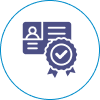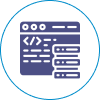1. What does it mean to create cloud applications?
The process of planning, creating, and putting online software programs that use cloud computing is called cloud application development. You can connect to these apps' remote servers through the internet, and they use cloud technology, platforms, and services.
2. What are the pros of building apps in the cloud?
Cloud application development has many benefits, such as the ability to grow, be flexible, save money, be accessible, be reliable, and offer better security. Businesses can come up with new ideas faster, add tools as needed, and cut costs by using cloud technology.
3. What are some of the most famous cloud platforms for making apps?
Amazon Web Services (AWS), Microsoft Azure, Google Cloud Platform (GCP), IBM Cloud, and Oracle Cloud are all well-known cloud systems for building apps. These platforms let you build, launch, and manage cloud-based apps with a lot of different services and tools.
4. What tools are most often used to build cloud-based apps?
Programming languages like Java, Python, JavaScript, and PHP are often used to build cloud applications. Frameworks and tools like Docker, Kubernetes, Terraform, and serverless computing platforms are also often used.
5. What are the different ways that cloud apps can be set up?
There are different ways to set up cloud services, such as in a public cloud, a private cloud, a hybrid cloud, or more than one cloud. When it comes to scalability, security, and resource management, each deployment style has its own benefits.
6. How do you make sure that developing cloud apps is safe?
Using best practices like data encryption, access limits, identity management, threat detection, and following rules and industry standards are all part of building secure cloud applications. There are also security services and tools that cloud providers give to help keep apps and data safe.
7. What are some problems that come up when making cloud-based apps?
Managing complexity, making sure data privacy and compliance, improving speed, avoiding vendor lock-in, and integrating with legacy systems can all be hard when making cloud applications. To deal with these problems, you need to plan ahead, have the right knowledge, and have the right tools.
8. How do you make sure that cloud application creation is scalable?
For cloud application development to be scalable, applications must be designed with scalability in mind, cloud platforms must be used to take advantage of auto-scaling features, distributed designs must be used, and resources must be used in the best way possible to handle changing workloads.
9. What part does DevOps play in making cloud apps?
A big part of building cloud apps is using DevOps techniques like infrastructure as code, continuous integration, and continuous release. DevOps helps make the process of building, deploying, and managing cloud-based apps more efficient. This lets them be delivered more quickly and with more flexibility.
10. How do you pick the best way to build cloud-based apps for your business?
What kind of cloud application development method to use relies on things like your business needs, your budget, your technical knowledge, your need for scalability, your security concerns, and your compliance needs. It's important to look at all of your choices and choose the one that fits your organization's goals and objectives the best.




































